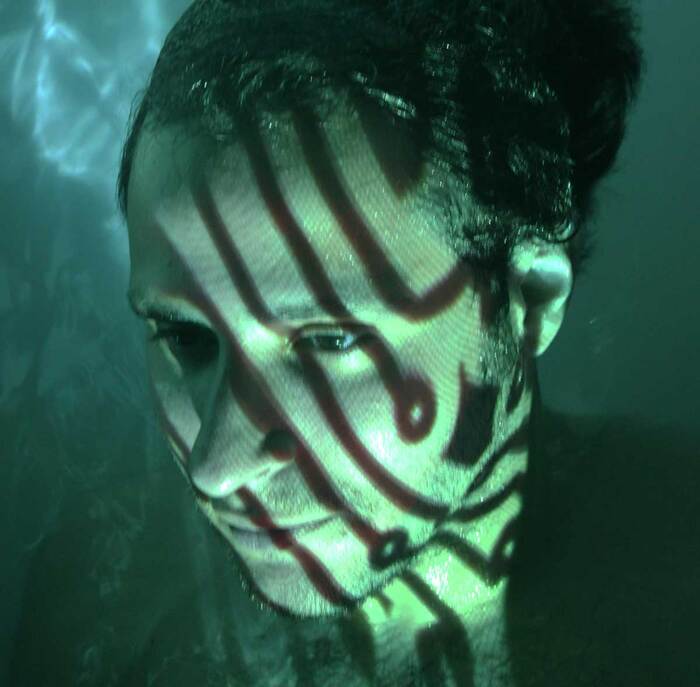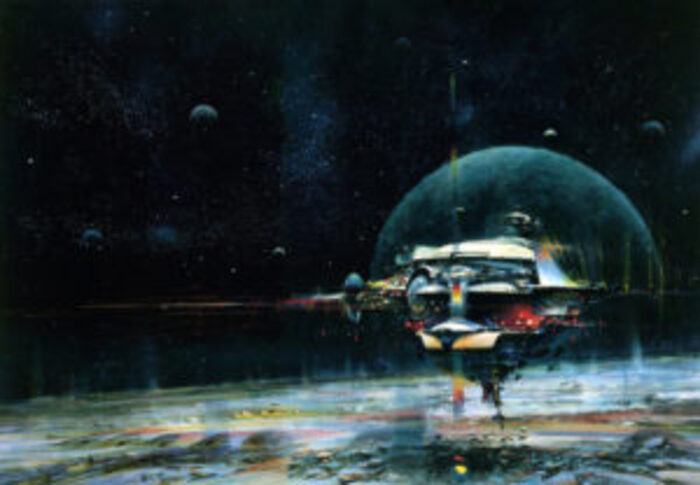Purveyor of: Synthtastic sci-fi epics
File next to: Jean-Michel Jarre, Bernard Fèvre, Steve Roach.
Playing: WL750, Sunday, March 18 @ The Gladstone Hotel – Melody Bar. Get your tickets here!
Ben Oginz is quite busy these days. Aside from playing in bands such as Toronto’s spacey kraut stalwarts MIMICO, crunchy rockers The Greggies, and minimal new wave synth acts Memorex and Mystic Triangle, he now has a number of excellent releases under his own name. Wavelength’s Aaron Dawson spoke with Ben ahead of his show at The Gladstone Hotel’s Melody Bar to talk science fiction and find out how he puts it all together.
What’s your process for writing music? You use a bunch of different synths. Do you have a favourite that you use as a kind of sketch pad, or do you have a different approach?
I don’t play favourites! I love them all equally. My process starts when I set up the synths in my go-to configuration, which changes every once in a while. Due to the fact I work out of a rehearsal space shared with other bands, I always have to tear down and set up. Someday I will really appreciate having a studio where everything’s always set up, but there’s a kind of zen about it when you have to start over each time. Once I’m set up, I get the synths warmed up and make sure they’re in tune with each other and then I just start getting sounds. I bounce from one synth to the other until all of them are sounding like I want them to individually. Then, I’ll rehearse an idea with them together a few times and hit record on the cassette 4-track when I’m ready. Lately it’s just been about getting the synths to a place where they’re talking to each other. I think of myself as the driver of a vehicle. Once I get everything going, I try not to overplay and just make sure we’re headed in the right direction.
All of the gear that you use is analogue, is that correct? What are your thoughts on the revived interest in analogue synths?
I have a few digital keyboards but mainly they are all analogue and vintage. When I came up in the early 2000’s, we were all about cheesy 80’s stuff. It’s a kind of a strange nostalgia we had for a time we never experienced. I remember staying up late watching old music videos and drooling over the synths in the videos. There was a sense of vintage synths being so out of reach and exotic to me back then, because I grew up playing on digital keyboards and the piano. When I bought my first vintage synth, the Korg Polysix I still use, the vintage craze seemed like it had already taken off. Virtual analog synths were everywhere, which only added to the demand for vintage. I think that for the most part, vintage synths stay in the studio, but since they’re all I have, I gig with them. It’s the mystique that makes vintage synths so attractive. Each one has a history and its own idiosyncrasies. I’m all for the revived interest in these instruments because it’ll keep them alive and working for longer. Technicians specialize in taking care of them and there are people making discontinued components themselves that would’ve gone extinct otherwise.
You have songs with structures and melodies, and others that are more ambient and free-form. Do you find using analogue gear allows for a kind of freedom, or is it a challenge to re-create songs at a live show. Do you try to re-create songs live or is it usually more of an improvisation based on a theme?
Recently, I haven’t been re-creating songs live. I’m just having more fun improvising these days. My set-up has been really liberating lately. The three synths in my configuration can operate separately or in sync with each other if need be. So I can focus on more textural elements and add some melody or harmony if I want. Maybe I’ll bring in a sequence or sync’ed arpeggios, or I can go full weird with more abstract soundscapes. My approach has just been to get really comfortable improvising a flow of ideas that form a sort of sonic landscape. I find the most difficult thing about re-creating compositions live is finding the original mood of a piece and sustaining that throughout the performance. It can feel a bit stale and robotic sometimes. That’s the beauty of playing solo, though. I do what I want!
I feel that it’s almost impossible to think of your music without thinking of science fiction (which I personally love!). There’s a very futuristic aspect to it, but also a nostalgic feel as well. The cover of your album Songs of Derogorn, for example, has an epic image that reminds me of sci-fi novels from the ’70s and ’80s. What are some of the influences on your music? What drives your creative process?
Good observation! I think what influences me most about sci-fi is the world-building aspect of it. There’s an incredible amount of detail that goes into these spaces, whether they’re depicted in print or on the screen. I’m especially drawn to the amazing modelling work and animatronics seen in the sci-fi films of the 70’s and 80’s — right before digital technology took over. The world around me and the environments I find myself in have the biggest impact on my music, though. Touring across North America a few times, the landscape really spoke to me, as I’m sure it does to everyone. There’s a vastness and strangeness to it because of the many geological abnormalities in the landscape, and there’s a really distinct sadness to it, too.
I hate it when science fiction and fantasy are lumped together in the bookstore. I love both but it makes searching that much harder and I feel it doesn’t give them enough respect. Do they belong together? Reading anything good lately?
I’m not as well-versed in fantasy as I am in science fiction. That’s a good point though, maybe they should have their own sections! I’ve been reading the first Altered Carbon novel by Richard Morgan, and trying to finish it before moving on to the Netflix series. Very descriptive writing, and adds to the cyberpunk canon quite nicely. Not sci-fi but Catching the Big Fish by David Lynch was another one I read recently and was great.
You and I have talked video games in the past. Have you worked on any music for video games, and if so how is that approach different (or is it?) from the music you make and perform live?
I actually haven’t worked on any music for video games yet, but there is one in the works that I will hopefully be working on soon. The approach will depend on what the developer is asking for, so you’re working within their vision which I’m looking forward to. It’s going to be a lot more challenging to get outside of my own head, but I’m up for it.
What’s coming up next for you?
MIMICO will be releasing some new music pretty soon so we’re planning our shows for spring and summer. I’ve been working on recordings with drummer Mike Duffield in a new project we have called Experts. We have been working with an awesome engineer named Alex Gamble and the recordings are really starting to take on a life of their own. I’m planning on putting together a movement class with a group of dancers that I’ll provide live synth accompaniment for. I’m going to be composing my first score for a short film, which is also really exciting for me. I have been meaning to put out a bunch more solo recordings as well. There’s a lot on my plate currently, but I’m cool with it. Collaboration is key for me right now, because I’ve been really focused on finishing the stuff I have been working on for the past year or two. I hope to do some more scoring work on video games and films, and to keep collaborating with people on interesting projects!


